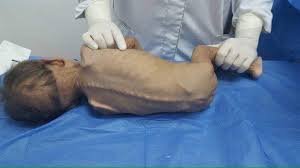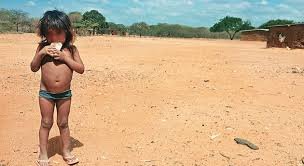Hello, big family, this is a very important topic in some countries where we see whole families suffering from an unsuitable diet, let's read a little.
Malnutrition is a pathological state of various clinical manifestations caused by poor assimilation of food by the body.
Malnutrition can be caused by inadequate nutrient intake or absorption, a low-calorie, low-protein diet, and the social or psychiatric conditions of those affected. It occurs frequently among low-income individuals and mainly among children in underdeveloped countries.
The difference between this and malnutrition is that in malnutrition there is a deficiency in the intake of calories and protein, while in malnutrition there is a deficiency, excess or imbalance in the intake of one or more nutrients that the body needs (example: vitamins, iron, iodine, calories, among others).
In infants, a clinical case of malnutrition may end in Kwashiorkor due to protein insufficiency in the diet or Marasmus, which results in an exaggerated weakness due to lack of a total calorie deficit in the diet.
In children, malnutrition can begin even in the womb. The consequences of child malnutrition are: short, pale, thin children, learning and intellectual development problems; increased chances of being obese as adults. Malnourished mothers give birth to malnourished children and those with anaemia have more difficulty giving birth to underweight children.
When we think of malnutrition, the first thing that comes to mind is lack of food and hunger. The images that probably come to mind are those of extremely thin children who barely have the strength to stand upright.
Images that often go around the world when a nutritional emergency occurs.
In the so-called 1,000 critical days of life, from pregnancy to the age of 2, the basic development of a child occurs. And it is that essential step when it comes to action: promoting breastfeeding, hygiene habits, creating water and sanitation facilities, ensuring access to adequate health care for mothers and children.
A child who is malnourished has not only had a sufficient amount of food, but what he or she ingested did not have the necessary nutrients for development. Malnutrition, however, is not just a matter of food.
This process is repeated in different places on our planet, some of them less or more in countries where the lack of food clashes with the abundance of wealth given by nature itself.
Inadequate care or the accumulation of infectious diseases are two elements that are always present in cases of malnutrition in children or the elderly, since they are a more vulnerable population, preceded by a lack of food (in quantity and quality), lack of care and the appearance of infections generate a vicious circle that can end the life of human beings. Not to mention the root causes of all this, which include social, economic and political factors where the factors of poverty should not be history for any country in the world pointed to in inequality or lack of education.
Malnutrition has a devastating short- and long-term impact. The effects on health are obvious, since it multiplies the probability of suffering from diseases such as pneumonia, diarrhoea or malaria due to the low level of defence provided by our organism once well nourished. That is why malnutrition is one of the worst enemies of survival.
The primary health care in the world is not waiting for the patient to visit you in the office, let's give a little of our time to visit and do prevention in cases when we knock on the door and get a being who wants only attention.
fuente

Until next time.... @elestilodeunafea


